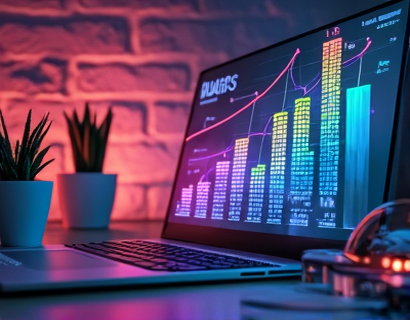AI and Crypto: Transforming App Ecosystems for Enhanced Productivity and Digital Innovation
The intersection of artificial intelligence (AI) and cryptocurrency is revolutionizing the way we approach app ecosystems, driving unprecedented levels of productivity and digital innovation. This fusion is not just a technological curiosity but a transformative force that is reshaping the digital landscape for tech-savvy professionals and early adopters. By leveraging the strengths of both AI and cryptocurrency, developers and businesses can create applications that are more efficient, secure, and user-friendly than ever before.
AI, with its ability to process vast amounts of data and learn from patterns, brings a level of intelligence and adaptability to applications that was previously unimaginable. When combined with the decentralized and secure nature of cryptocurrency, the potential for innovation becomes even more profound. This article delves into how this powerful combination is redefining app ecosystems, enhancing productivity, and fostering digital innovation.
Enhancing App Ecosystems with AI
AI technologies, such as machine learning, natural language processing, and computer vision, are being integrated into app ecosystems to create smarter, more intuitive applications. These technologies enable apps to understand user behavior, predict needs, and automate tasks, thereby significantly improving user experience and efficiency.
For instance, AI-driven chatbots are becoming ubiquitous in various industries, from customer service to healthcare. These chatbots can handle a wide range of queries, provide personalized recommendations, and even assist in complex decision-making processes. By offloading routine tasks to AI, human users can focus on higher-value activities, leading to increased productivity and satisfaction.
Moreover, AI can optimize app performance by dynamically adjusting resources based on user demand. This ensures that applications run smoothly even under heavy loads, reducing downtime and enhancing reliability. In the context of app ecosystems, this means a more seamless and consistent user experience across multiple applications and services.
Cryptocurrency: A Secure and Decentralized Foundation
Cryptocurrency, particularly blockchain technology, provides a secure and decentralized foundation for app ecosystems. Blockchain's inherent transparency and immutability ensure that transactions are secure and tamper-proof, which is crucial for building trust in digital applications.
Smart contracts, self-executing contracts with the terms directly written into code, are another key feature of blockchain. These contracts can automate and enforce agreements between parties without the need for intermediaries, reducing costs and increasing efficiency. In app ecosystems, smart contracts can facilitate seamless interactions between different applications and services, creating a more integrated and cohesive user experience.
Furthermore, cryptocurrency enables new models of monetization and incentivization within app ecosystems. Developers can create tokenized economies where users earn tokens for contributing value, such as providing data, completing tasks, or participating in community governance. These tokens can be used to purchase services, access premium features, or even traded on decentralized exchanges, fostering a more engaged and motivated user base.
Synergy Between AI and Cryptocurrency
The true power of combining AI and cryptocurrency lies in their synergistic effects. AI can enhance the functionality and security of blockchain-based applications, while blockchain can provide a trustworthy and transparent environment for AI models to operate.
For example, AI can be used to analyze blockchain data to identify patterns, predict trends, and optimize resource allocation. This can be particularly useful in decentralized finance (DeFi) applications, where AI-driven algorithms can help manage risk, detect fraud, and improve investment strategies. By leveraging AI, DeFi platforms can offer more sophisticated and reliable services, attracting a broader range of users.
On the other hand, blockchain can ensure the integrity and security of AI models and their data. By storing model parameters and training data on a blockchain, developers can prevent tampering and ensure that the models are based on authentic and unaltered data. This is crucial for maintaining the trustworthiness of AI-driven applications, especially in critical domains like healthcare and finance.
Case Studies: Real-World Applications
Several real-world applications demonstrate the potential of AI and cryptocurrency in transforming app ecosystems. One notable example is a decentralized marketplace for digital assets, where AI is used to match buyers and sellers based on their preferences and market trends. The marketplace operates on a blockchain, ensuring transparent and secure transactions. AI algorithms analyze user behavior and market data to optimize pricing and matchmaking, creating a more efficient and user-friendly experience.
Another example is a healthcare app that uses AI to analyze medical data stored on a blockchain. The app can provide personalized health recommendations and alert users to potential health risks. Smart contracts ensure that patient data is shared securely and only with authorized parties, maintaining privacy and compliance with regulations. This integration of AI and blockchain not only enhances the app's functionality but also builds trust among users.
Challenges and Considerations
While the combination of AI and cryptocurrency offers numerous benefits, there are also challenges and considerations that need to be addressed. One major challenge is the technical complexity involved in integrating these technologies. Developers must have a solid understanding of both AI and blockchain to create robust and efficient applications.
Another consideration is the regulatory landscape. Cryptocurrency and AI are still evolving fields, and regulations vary widely across different regions. Developers and businesses must navigate these regulations carefully to ensure compliance and avoid legal issues. Additionally, there are concerns around privacy and data security, which must be addressed to gain user trust.
Scalability is another important factor. As the number of users and transactions grows, the system must be able to handle increased load without compromising performance. This requires careful design and optimization of both AI algorithms and blockchain infrastructure.
Future Prospects
The future of app ecosystems with AI and cryptocurrency is promising. As technology continues to advance, we can expect even more innovative applications that leverage the strengths of both domains. For instance, the integration of AI with other emerging technologies like the Internet of Things (IoT) and 5G networks will create more interconnected and intelligent systems.
In the realm of cryptocurrency, the development of more efficient consensus mechanisms and the adoption of layer 2 solutions will enhance the scalability and sustainability of blockchain-based applications. This will make it easier for developers to build complex and resource-intensive AI-powered apps on the blockchain.
Moreover, the growing interest in decentralized autonomous organizations (DAOs) and community-driven governance models will further transform app ecosystems. AI can play a crucial role in these models by analyzing community feedback, predicting trends, and optimizing decision-making processes. This will lead to more democratic and user-centric applications.
Conclusion
The fusion of AI and cryptocurrency is revolutionizing app ecosystems, offering unprecedented opportunities for productivity and digital innovation. By combining the intelligence of AI with the security and decentralization of cryptocurrency, developers and businesses can create applications that are more efficient, secure, and user-friendly. As the technology continues to evolve, the potential for transformative applications is vast, making this an exciting and pivotal moment in the digital landscape.











































